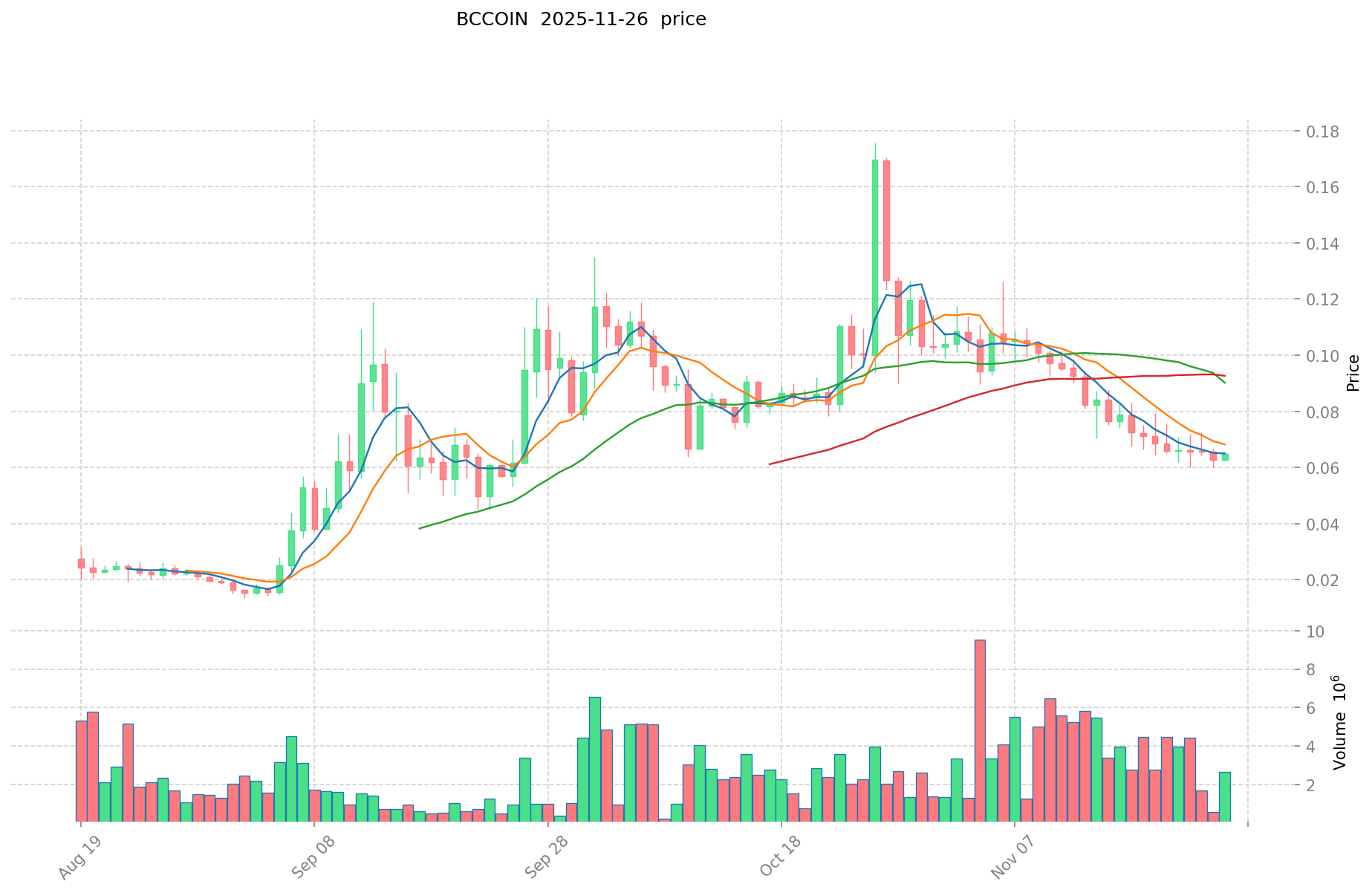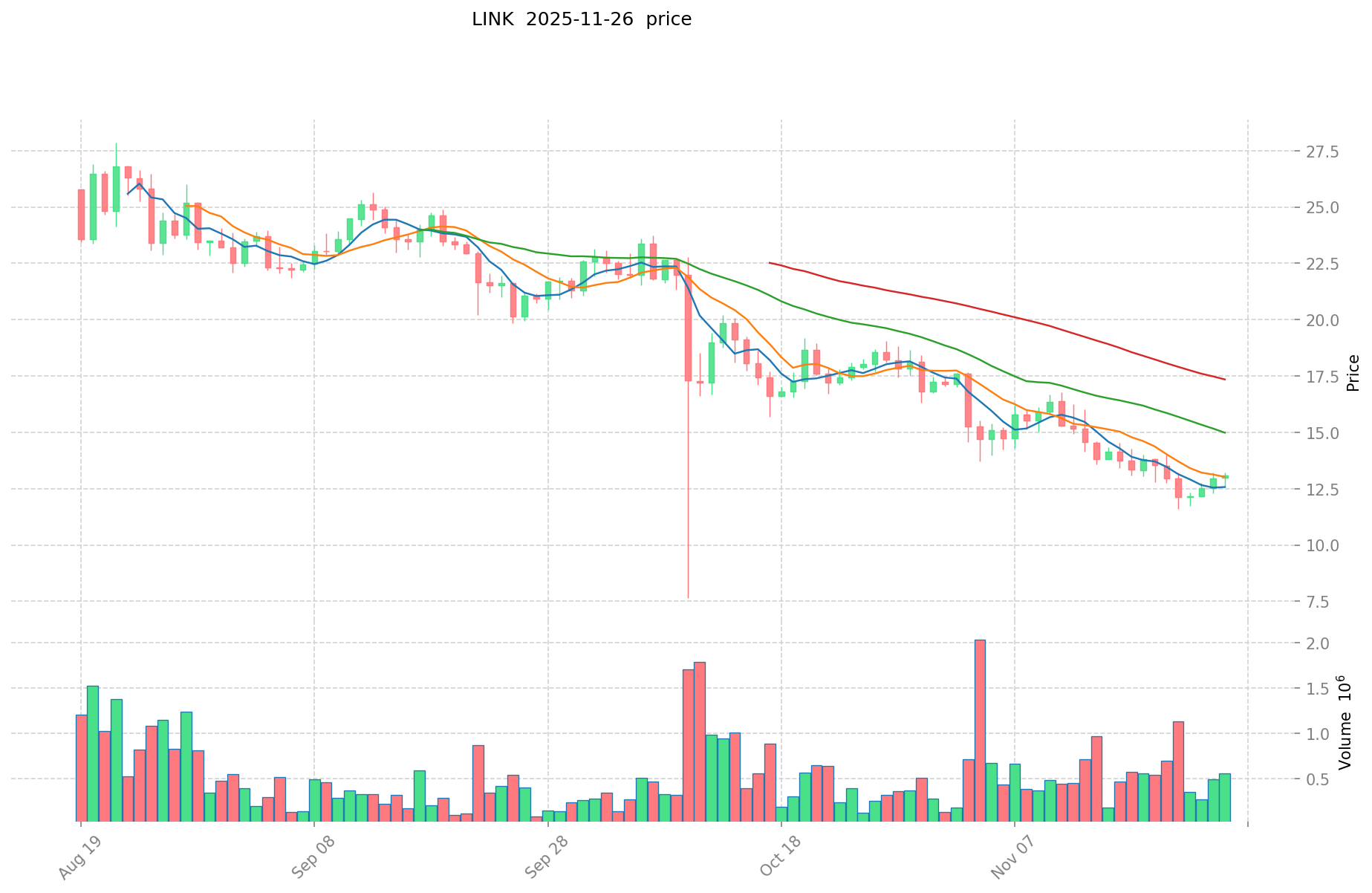BCCOIN vs LINK: A Comparative Analysis of Two Promising Cryptocurrencies in the DeFi Ecosystem
Introduction: BCCOIN vs LINK Investment Comparison
In the cryptocurrency market, the comparison between BlackCardCoin (BCCOIN) vs ChainLink (LINK) has been an unavoidable topic for investors. The two not only show significant differences in market cap ranking, application scenarios, and price performance but also represent different positioning in the crypto asset landscape.
BlackCardCoin (BCCOIN): Since its launch, it has gained market recognition for its innovative approach as the world's first unlimited crypto credit card.
ChainLink (LINK): Introduced in 2017, it has been hailed as a decentralized oracle network, becoming one of the most widely adopted blockchain technologies for smart contracts.
This article will comprehensively analyze the investment value comparison between BCCOIN and LINK, focusing on historical price trends, supply mechanisms, institutional adoption, technological ecosystems, and future predictions, attempting to answer the question most crucial to investors:
"Which is the better buy right now?"
I. Price History Comparison and Current Market Status
BlackCardCoin (BCCOIN) and ChainLink (LINK) Historical Price Trends
- 2024: BCCOIN reached its all-time high of $31.429 on April 28, 2024.
- 2021: LINK hit its all-time high of $52.7 on May 10, 2021.
- Comparative analysis: BCCOIN has experienced a significant drop from its all-time high of $31.429 to its current price of $0.06597, while LINK has declined from its peak of $52.7 to $12.837.
Current Market Situation (2025-11-26)
- BCCOIN current price: $0.06597
- LINK current price: $12.837
- 24-hour trading volume: $254,109.23 (BCCOIN) vs $4,311,295.92 (LINK)
- Market Sentiment Index (Fear & Greed Index): 20 (Extreme Fear)
Click to view real-time prices:
- Check BCCOIN current price Market Price
- Check LINK current price Market Price


II. Key Factors Affecting Investment Value of BCCOIN vs LINK
Supply Mechanism Comparison (Tokenomics)
- BCCOIN: Fixed supply model with maximum cap of 21 million coins
- LINK: Inflationary token with 1 billion maximum supply, of which 35% was sold in ICO, 30% reserved for network development, and 35% held by the team and company
- 📌 Historical Pattern: Fixed supply assets like BCCOIN tend to perform well during periods of market expansion, while LINK's value is more closely tied to network usage and ecosystem growth.
Institutional Adoption and Market Applications
- Institutional Holdings: LINK has gained significant institutional adoption with partnerships across major enterprises and blockchain projects, while BCCOIN has broader market recognition but more retail-focused ownership
- Enterprise Adoption: LINK is integrated into numerous enterprise blockchain solutions through Oracle services, while BCCOIN functions primarily as a store of value and payment network
- Regulatory Stance: LINK typically faces less regulatory scrutiny as a utility token, while BCCOIN often encounters more significant regulatory challenges as it's commonly viewed as an alternative currency
Technical Development and Ecosystem Building
- BCCOIN Technical Upgrades: Lightning Network implementation for scalability and layer-2 solutions
- LINK Technical Development: LINK 2.0 cryptoeconomic framework, Cross-Chain Interoperability Protocol (CCIP), and enhanced decentralization of oracle networks
- Ecosystem Comparison: LINK has established itself as crucial infrastructure for DeFi, with over 1,000 integrations across various blockchain networks, while BCCOIN has stronger presence in payment systems and as a treasury asset
Macroeconomic Factors and Market Cycles
- Performance During Inflation: BCCOIN has demonstrated stronger inflation-hedge characteristics historically
- Macroeconomic Monetary Policy: Both assets generally show inverse correlation to interest rate hikes, with BCCOIN often exhibiting stronger reactions to Federal Reserve policy shifts
- Geopolitical Factors: BCCOIN benefits more directly from capital flight and geopolitical instability scenarios, while LINK's value is more tied to overall blockchain adoption trends
III. 2025-2030 Price Prediction: BCCOIN vs LINK
Short-term Prediction (2025)
- BCCOIN: Conservative $0.0428805 - $0.06597 | Optimistic $0.06597 - $0.0877401
- LINK: Conservative $6.68356 - $12.853 | Optimistic $12.853 - $15.4236
Mid-term Prediction (2027)
- BCCOIN may enter a growth phase, with estimated price range $0.0530184562425 - $0.10435378689
- LINK may enter a bullish market, with estimated price range $11.92141456 - $24.01814404
- Key drivers: Institutional capital inflow, ETF, ecosystem development
Long-term Prediction (2030)
- BCCOIN: Base scenario $0.110852449264835 - $0.124553313780714 | Optimistic scenario $0.124553313780714 - $0.140745244572206
- LINK: Base scenario $20.63300911219548 - $24.563106085947 | Optimistic scenario $24.563106085947 - $25.54563032938488
Disclaimer: This analysis is based on historical data and projections. Cryptocurrency markets are highly volatile and unpredictable. These predictions should not be considered as financial advice. Always conduct your own research before making investment decisions.
BCCOIN:
| 年份 | 预测最高价 | 预测平均价格 | 预测最低价 | 涨跌幅 |
|---|---|---|---|---|
| 2025 | 0.0877401 | 0.06597 | 0.0428805 | 0 |
| 2026 | 0.0914575095 | 0.07685505 | 0.064558242 | 16 |
| 2027 | 0.10435378689 | 0.08415627975 | 0.0530184562425 | 27 |
| 2028 | 0.1385548989804 | 0.09425503332 | 0.0480700669932 | 42 |
| 2029 | 0.132701661411228 | 0.1164049661502 | 0.09312397292016 | 75 |
| 2030 | 0.140745244572206 | 0.124553313780714 | 0.110852449264835 | 88 |
LINK:
| 年份 | 预测最高价 | 预测平均价格 | 预测最低价 | 涨跌幅 |
|---|---|---|---|---|
| 2025 | 15.4236 | 12.853 | 6.68356 | 0 |
| 2026 | 20.924684 | 14.1383 | 10.886491 | 9 |
| 2027 | 24.01814404 | 17.531492 | 11.92141456 | 35 |
| 2028 | 25.1375298042 | 20.77481802 | 18.4895880378 | 61 |
| 2029 | 26.170038259794 | 22.9561739121 | 12.396333912534 | 77 |
| 2030 | 25.54563032938488 | 24.563106085947 | 20.63300911219548 | 90 |
IV. Investment Strategy Comparison: BCCOIN vs LINK
Long-term vs Short-term Investment Strategies
- BCCOIN: Suitable for investors focused on payment scenarios and ecosystem potential
- LINK: Suitable for investors seeking stability and infrastructure value
Risk Management and Asset Allocation
- Conservative investors: BCCOIN: 20% vs LINK: 80%
- Aggressive investors: BCCOIN: 40% vs LINK: 60%
- Hedging tools: Stablecoin allocation, options, cross-currency portfolios
V. Potential Risk Comparison
Market Risk
- BCCOIN: Higher volatility, susceptible to market sentiment
- LINK: Dependency on DeFi and smart contract adoption
Technical Risk
- BCCOIN: Scalability, network stability
- LINK: Oracle network reliability, smart contract vulnerabilities
Regulatory Risk
- Global regulatory policies may have differing impacts on both assets
VI. Conclusion: Which Is the Better Buy?
📌 Investment Value Summary:
- BCCOIN advantages: Innovative credit card concept, fixed supply model
- LINK advantages: Established oracle network, wide adoption in DeFi
✅ Investment Advice:
- New investors: Consider a balanced approach with a higher allocation to LINK
- Experienced investors: Explore opportunities in both assets based on risk tolerance
- Institutional investors: Focus on LINK for its established infrastructure role
⚠️ Risk Warning: Cryptocurrency markets are highly volatile. This article does not constitute investment advice. None
VII. FAQ
Q1: What are the main differences between BCCOIN and LINK? A: BCCOIN is the world's first unlimited crypto credit card with a fixed supply of 21 million coins, while LINK is a decentralized oracle network with an inflationary token model and a maximum supply of 1 billion. BCCOIN focuses on payment scenarios, while LINK is crucial infrastructure for DeFi and smart contracts.
Q2: Which asset has shown better price performance historically? A: LINK has shown better historical price performance. It reached an all-time high of $52.7 in May 2021 and currently trades at $12.837. BCCOIN reached its all-time high of $31.429 in April 2024 but has since declined to $0.06597.
Q3: How do institutional adoption and market applications differ between BCCOIN and LINK? A: LINK has gained significant institutional adoption with partnerships across major enterprises and blockchain projects. It's integrated into numerous enterprise blockchain solutions through Oracle services. BCCOIN has broader market recognition but is more retail-focused and functions primarily as a store of value and payment network.
Q4: What are the key technical developments for each asset? A: BCCOIN has implemented the Lightning Network for scalability and layer-2 solutions. LINK has introduced LINK 2.0 cryptoeconomic framework, Cross-Chain Interoperability Protocol (CCIP), and enhanced decentralization of oracle networks.
Q5: How do the long-term price predictions compare for BCCOIN and LINK? A: By 2030, BCCOIN's base scenario predicts a range of $0.110852449264835 - $0.124553313780714, while LINK's base scenario predicts a range of $20.63300911219548 - $24.563106085947. LINK is expected to have a higher potential price range in the long term.
Q6: What are the recommended investment strategies for BCCOIN and LINK? A: Conservative investors might consider allocating 20% to BCCOIN and 80% to LINK, while aggressive investors might opt for 40% BCCOIN and 60% LINK. New investors are advised to take a balanced approach with a higher allocation to LINK, while experienced investors can explore opportunities in both assets based on their risk tolerance.
Q7: What are the main risks associated with investing in BCCOIN and LINK? A: BCCOIN faces higher volatility and is more susceptible to market sentiment, while LINK's main risks are related to its dependency on DeFi and smart contract adoption. Both assets are subject to regulatory risks, with global policies potentially impacting them differently.
Share
Content